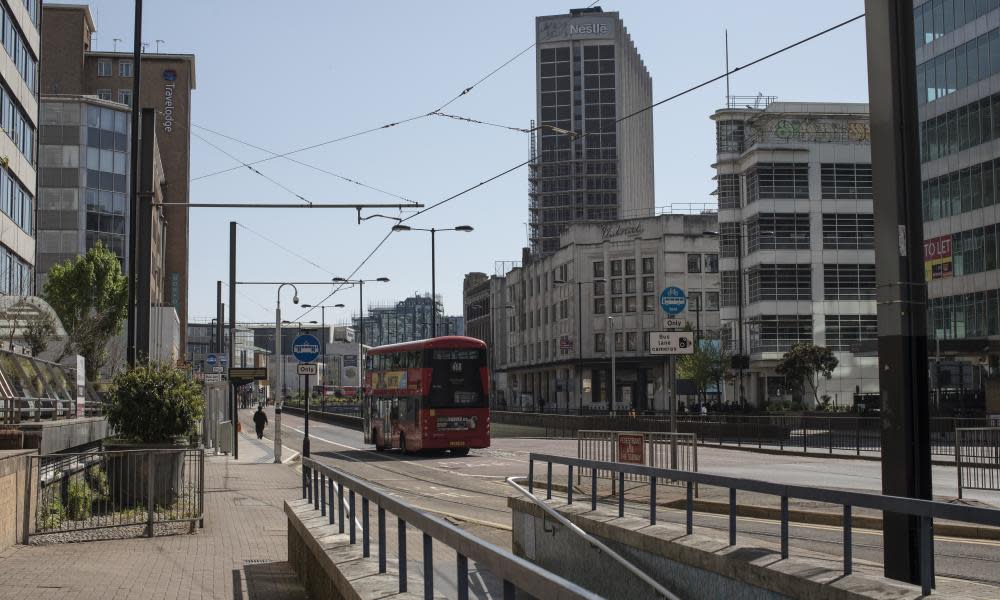Croydon council outlines drastic cuts to jobs and services

Croydon council has outlined a drastic “renewal” plan that would result in extensive staff job losses and major reductions to services at libraries and children’s centres, in one of the most dramatic cuts programmes ever seen in local government.
The Labour-run council, which in effect declared itself insolvent earlier this month after revealing a £67m hole in its budget, said it would in future adopt a bare legal minimum approach focused mainly on providing social care and refuse collection services.
“This will mean some tough decisions for the council. We will stop delivering some services that we know our communities find valuable,” the council said in a report discussed by the council’s cabinet on Wednesday evening.
The south London borough said it had approached the government for a £134m loan to keep it afloat while it develops a three-year plan to “live within its means”. The cuts programme was the price of retaining local control of the council and warding off a government takeover, the council said.
Developments in Croydon will be closely watched by local authorities across England, many of whom also face making severe cuts to services to balance the books unless the government announces substantial funding increases in Wednesday’s Treasury spending review.
“Our absolute priority is to balance our books, live within our means and offer the good value for money services our residents need and expect from us,” said the Croydon council leader, Hamida Ali.
Croydon issued a section 114 notice earlier this month, effectively declaring itself bankrupt. An audit report accused it of “collective corporate blindness” that goes back several years, lax financial controls, and a weak governance culture which failed to challenge poor spending decisions.
It now faces a major upheaval, in the middle of a pandemic, and after several years of austerity cuts. “The scale of the challenge the local authority faces is unprecedented and will require one of the most significant change programmes in local government,” the council said.
Papers prepared for Wednesday’s cabinet meeting said the council would seek hefty service cuts while attempting to provide “the best quality core service we can afford”. That translates as prioritising social care services for the poorest and most vulnerable residents, and keeping the borough’s streets “clean and safe”.
However, this means the bulk of the cuts will fall on the council’s so-called “non-core” services, resulting in the likely closure of some of its 13 libraries and nine children’s centres. Leisure centres, and waste and recycling facilities will also face the axe, while 35 council-owned buildings will be shut or sold.
It is also seeking to offload responsibility for the care of some of its 249 unaccompanied asylum seeker children to other local authorities. The borough, where the Home Office’s Lunar House immigration centre is based, says that according to government rules it should be responsible for just 66.
Despite its commitment to focus on its most vulnerable residents, the council admitted in its own cuts impact assessment that closures to children’s centres would hold back child development in the poorest families. It also plans to cut its welfare benefits advice team – despite a 300% increase in demand in recent months.
There is likely to be another wave of staff job losses – 400 posts were axed earlier this year – as services are pared down and the council moves towards a more online and automated approach. Non-essential spending will be prohibited, and there will be a block on recruitment and hiring agency staff.
The council has admitted employee morale is low, and promised to erase a “fearful” culture in which staff were reluctant to speak out. A staff survey reveals “palpable anger and vitriol towards senior management” as well as allegations of nepotism, cronyism, racism, and discrimination.
A separate report to the council on £200m of loans to its housing development subsidiary, Brick by Brick, revealed that only a handful of the affordable homes it had aimed to develop had been delivered, putting the council at “serious financial risk”.
Croydon is only the second council in two decades to go bust. The other was Tory-run Northamptonshire county council, which suffered similarly deep-rooted corporate failings, forcing it into effective bankruptcy in 2018.

 Yahoo Movies
Yahoo Movies 
